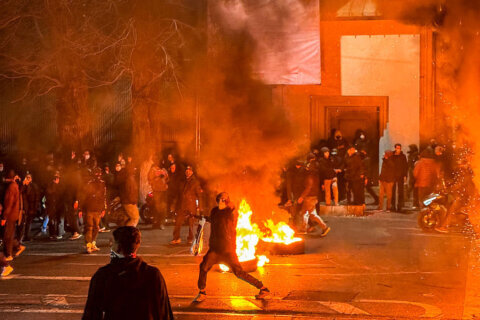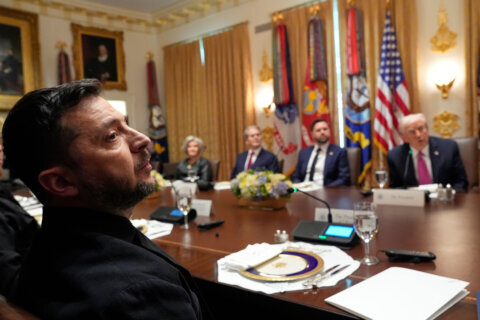WASHINGTON — A shackled man with a horrified look on his face stood in a cage wearing an orange jumpsuit with streams of flames climbing up his legs. It’s one of the images released by The Islamic State of Iraq and the Levant (ISIL) of Jordanian pilot Lt. Muath Al-Kaseasbeh being burned alive.
The images sickened and rattled even seasoned intelligence, military and foreign affairs experts and officials.
Normally calm and measured analysts had visceral reactions.
“You just have to slaughter them all. ISIL is a virus that has to be stamped out,” Robert Baer, a former CIA covert operative, told WTOP. “I’ve seen some horrible things done to people around the world, but nothing like this.”
Moments after the news broke, President Barack Obama interrupted his remarks during a White House event about the Affordable Care Act, saying, “I don’t know the details, but it’s just one more indication of the viciousness and barbarity of this organization.”
As the news of Al-Kaseasbeh’s heinous murder began to sink in amid angry cries rising up from Jordan, the reality that he died weeks ago emerged. Jordanian state television reported he died on or about Jan. 3, 2015.
Many wonder why ISIL spent the last three weeks supposedly engaged in negotiations to swap the pilot for jailed Iraqi Sajida al-Rishawi. Al-Rishawi and another al-Qaida prisoner were executed before dawn Wednesday.
That question swept the halls of intelligence organizations and think-tanks worldwide.
“It is hard to understand, but perhaps they felt they had no immediate advantage in announcing that they had killed him particularly as they were negotiating for the release of the woman involved in the 2005 hotel bombing who was in prison in Jordan,” said Richard Barrett, former head of the al-Qaida and Taliban monitoring team.
Barrett is among experts who believe it was shortsighted for ISIL to kill the pilot and then hope the Jordanians wouldn’t find out. He believes ISIL had an internal struggle over what to do with Al-Kaseasbeh.
“Some wanted to swap him and others wanted to kill him,” said Barrett.
“I don’t think the Islamic State reckoned that they would lose anything by waiting. They felt the horror would remain, but I think they felt if they could negotiate something on the assumption that perhaps if people didn’t know he was dead for sure, then they would take the advantage.”
ISIL’s campaign of terror, which began with a lightning fast sweep through Iraq in mid-2014, has escalated with each passing month.
“From 10 June, we found ourselves with a 1,035-kilometer border with terrorists, a border that until the end of 2011 had been guarded by six Iraqi security forces divisions and a U.S. military division. Suddenly our Peshmerga had to protect this border alone, with outdated and limited weaponry,” said Falah M. Bakir, the Kurdistan regional government’s minister of Foreign Relations.
Later in June, the Kurdish government asked the United States for weapons, because “ours wouldn’t match the modern American weapons that ISIS had captured from the Iraqi army after it fled,” said Bakir.
By July, the organization started a string of gruesome murders by beheading 75 Syrian soldiers. As 2014 ended, a number of people from countries around the world were beheaded by ISIL and videos were posted to social media.
The U.S. military has wasted little time confirming that the killing will not dampen the coalition’s resolve to defeat ISIL.
Using the metaphor of a speeding vehicle, Pentagon spokesman Rear Admiral John Kirby reaffirmed the U.S. resolve to degrade and eventually terminate ISIL.
“Nobody’s letting off the gas. We’re going to continue to put pressure on ISIL, regardless of these barbaric acts,” Kirby said.
“What these acts do is bring into stark relief just how despicable these people are and the contempt for life they have,” Kirby said.
Baer, who spent many of his 20 years at the CIA undercover in the Middle East said, “The only way to stop ISIL is, we have to stop lying to ourselves about the geopolitical realities in the region and rise up as humankind against ISIL and all of its supporters.
“You’re out of your mind if you ignore what’s going on behind the scenes. There’s lot more support going to the Islamic State from the Gulf States.”
Until that happens, Baer insists depraved acts like Lt. Al-Kaseasbeh’s burning will continue.








